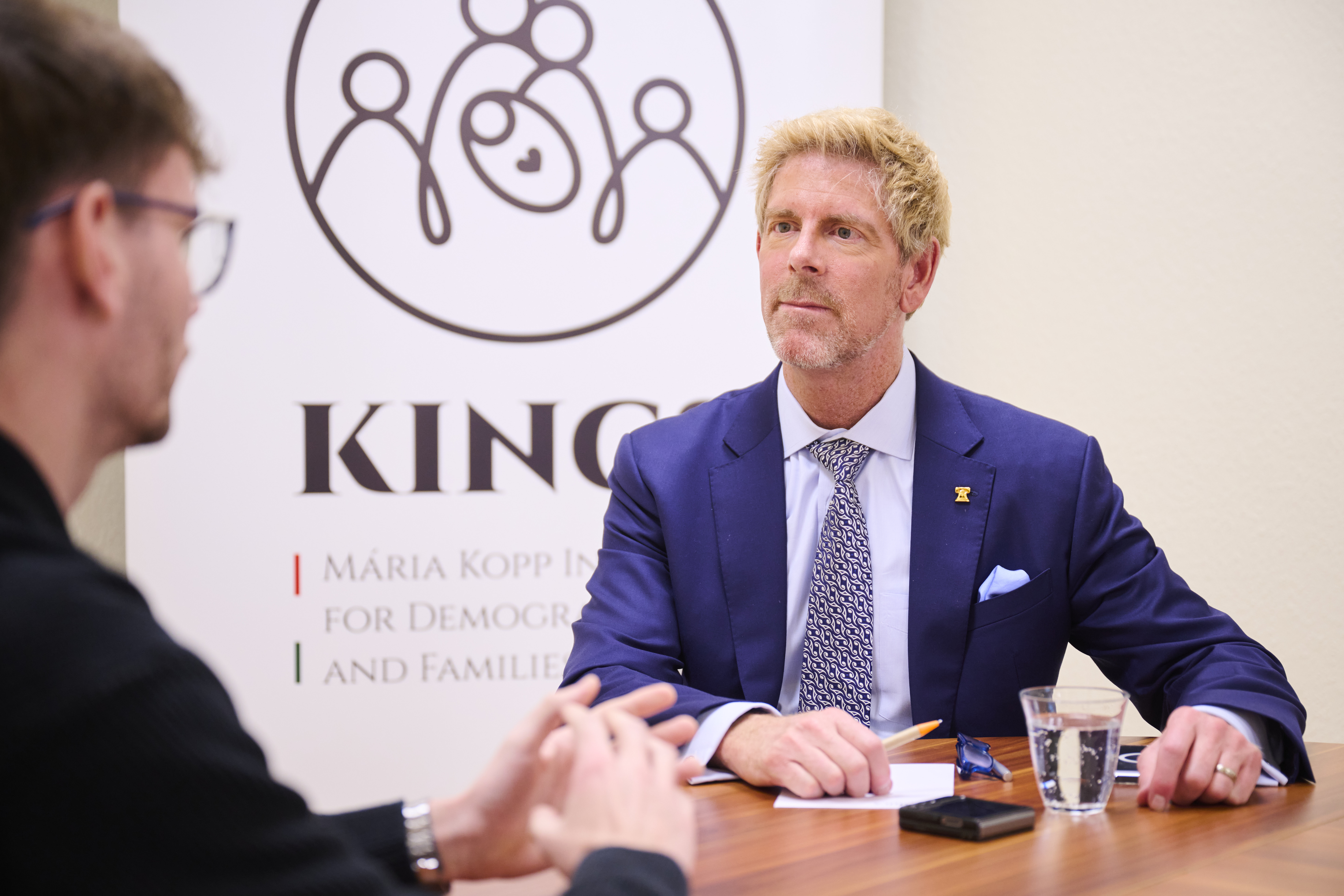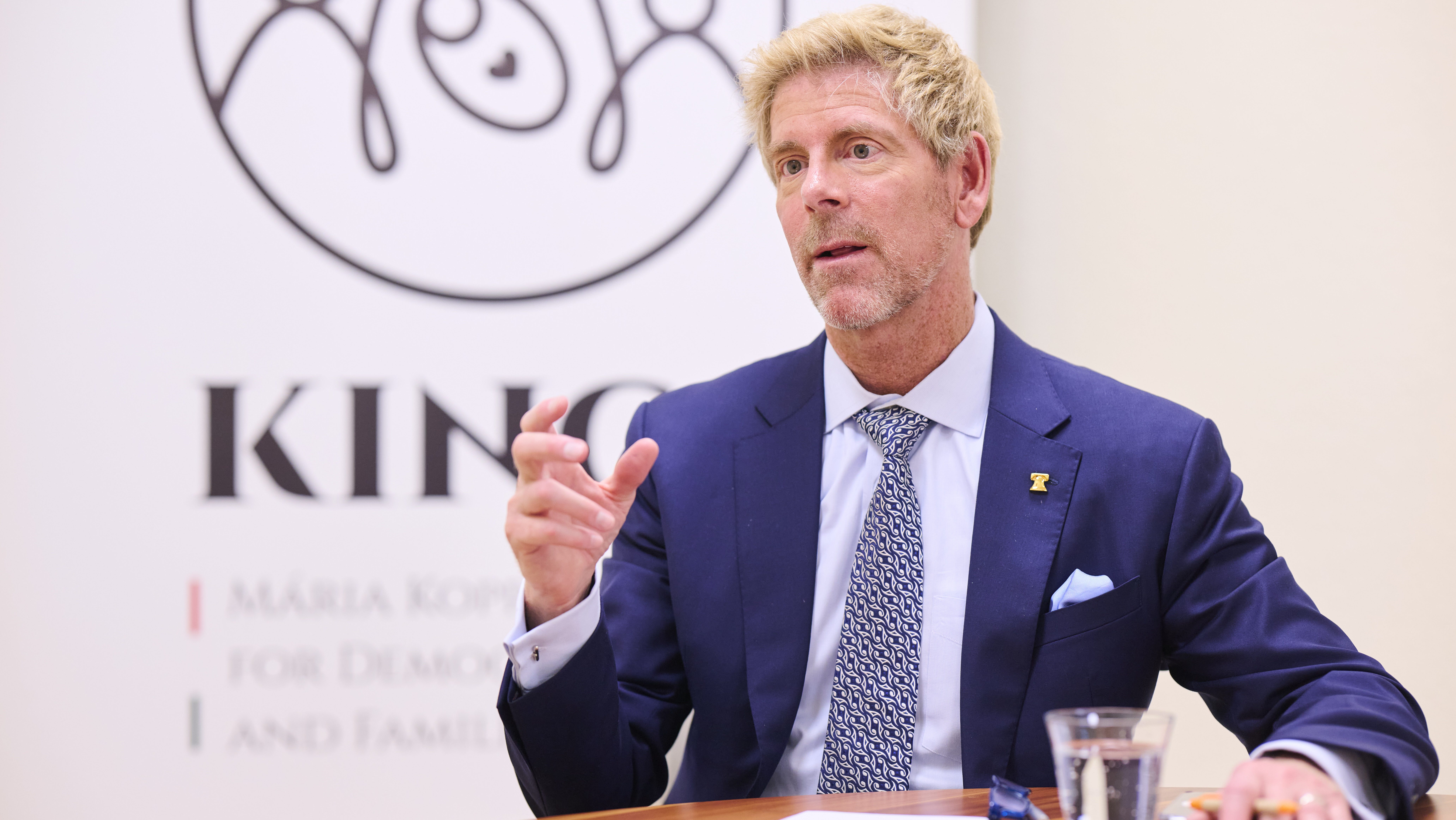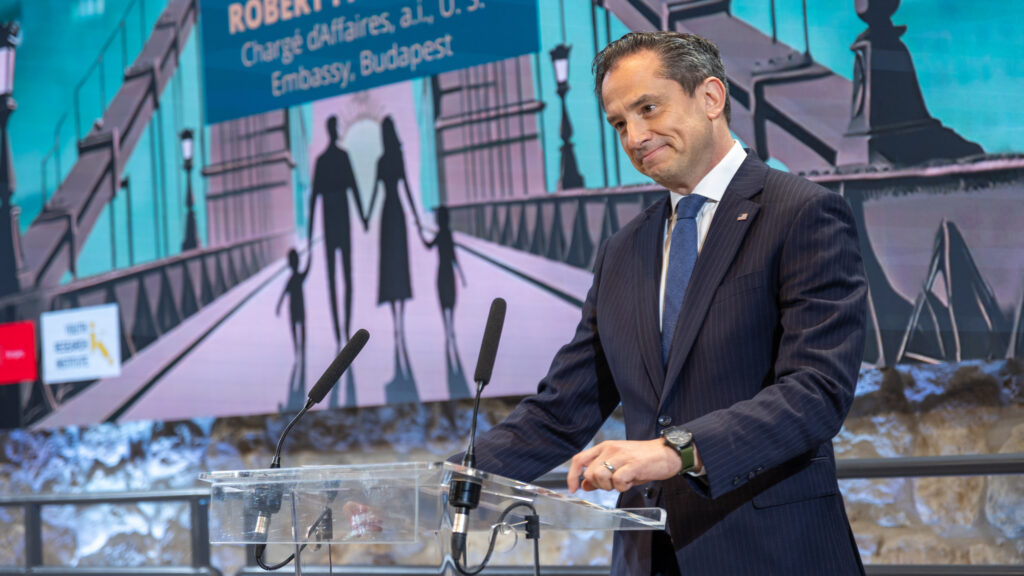Jay W Richards serves as Director of the Richard and Helen DeVos Center for Life, Religion, and Family and is the William E Simon Senior Research Fellow at the Washington-based Heritage Foundation. He recently visited Hungary to participate in a background discussion at the Mária Kopp Institute for Demography and Families, aiming to gain an in-depth understanding of Hungarian family policies. Mr Richards also sat down for an interview with Hungarian Conservative, where he discussed the demographic crisis affecting Western societies and the potential solutions a future Trump administration could offer. Additionally, he praised Hungarian family policy as a model to be followed by other countries.
***
With Donald Trump’s historic re-election, significant changes can be anticipated across various policy areas, including family policy. What developments might we expect in this field?
So public policy experts and analysts like people at the Heritage Foundation have been focusing on the demographic crisis and total fertility for several years. It’s not yet a widespread political topic in the sense that the average voter doesn’t know anything about it. What was decisive in the 2024 election with respect to family would be the debate over gender ideology. Many social conservatives felt like we just had loss after loss after loss. We lost the fight in 2015 on marriage and so on.* Initially, many political conservatives thought: ‘I don’t want to get into the debate on gender ideology,’ yet in the last two and a half years it’s become a major issue. We now know with exit polling that this question of gender ideology of males in female sports and bathrooms and so forth was actually a decisive question for swing voters. People who had not yet decided until the last minute who they were going to vote for broke largely for Donald Trump over Kamala Harris specifically on this issue. I think that’s hugely important because that means now that Democrats who lost as a result of this issue might finally rethink their commitment to it.
I’m also hoping that the success over this battle in leading to Trump’s victory will now encourage him to turn to other family policies. At the moment, the question of marriage and large families is not really on the agenda. What is on the agenda is the crisis of chronic diseases among children, in particular the crisis of mental illness, anxiety, depression, the massive increase in gender dysphoria, and physical illnesses, things like obesity and type 2 diabetes. There is a serious epidemic in the United States, represented by the alliance of Donald Trump and Robert F Kennedy Jr. I’m hoping that there’s a way to frame some of these family policy issues in terms of this health crisis, because I think that would be a way to introduce questions about demography to the American public, who at the moment is just simply not thinking about these issues.
I'm glad you've brought up Kennedy’s appointment, as the Health Department is set to play a pivotal role in shaping family policies. However, Kennedy's appointment has sparked significant outrage in mainstream left-wing media. What were the reasons behind this backlash, and what might we expect from him moving forward?
Robert F Kennedy Jr has been the subject of a very hostile media campaign trying to write him off as a crank and a conspiracy theorist. What’s amusing about this is that he was a lifelong Democrat. He was an environmental lawyer. In fact, his first encounter with Donald Trump was suing him over an environmental issue having to do with a golf course that Trump wanted to build. By all accounts, you would think that left-wing media would support Robert F Kennedy Jr. Unfortunately, he committed a couple of ‘unforgivable sins’. First, he has challenged what we call the cartel between federal government regulatory agencies, big food, big agriculture, and big pharma. There is effectively a kind of corporatist cartel between the federal government and these large pharmaceutical corporations, it’s not simply one or the other. It’s not public sector versus private sector. You have a fusion of the public and private sectors in this area. Kennedy was a voice crying in the wilderness against this problem. The reality is that pharmaceutical companies virtually underwrite the American media, with massive ad dollars both in print and broadcast media. You can just not expect the media ever to look at the pharmaceutical industry as sceptically as RFK has done.

The second unforgivable sin is to align himself with Donald Trump. I am quite certain that if Robert F Kennedy Jr had dropped out and started campaigning for Kamala Harris, the media would have portrayed him differently. But he decided that Donald Trump, despite being an unconventional candidate, was by far the best prospect for actually making a difference in Washington, DC. I think that Robert F Kennedy Jr has made the right decision. He recognizes that Donald Trump is very much an outsider. He is not dependent upon the national security and intelligence apparatus. He’s not beholden to the pharmaceutical lobby. It’s just that kind of outsider that could make a difference. So while it might from the outside look like a very unconventional or unlikely alliance, I think that ultimately it makes sense because if anyone is going to break up the cartel between big pharma and federal government agencies, it’s going to have to be an outsider, and Donald Trump was the only outsider running in this election.
Family policy is an area that demands sustained dedication to achieve long-term success. How can it be safeguarded from the mainstream media’s and the Democrats’ anti-Trumpism?
It would be unfortunate if the left-wing media and the political left in the United States tried to denounce introduction of family policy as just something that Donald Trump sort of made up in his head. Family policy, if it’s going to succeed, has to persist over many years. We can’t have a sort of a tax subsidy, for instance, that only works for a couple of years and then the next Congress comes in and it’s reversed. We really need some degree of bipartisan agreement that the demographic crisis is in fact a crisis. Honestly, in just speculating, I think that JD Vance, the vice presidential candidate with President Trump, is the more likely messenger on this. He’s young, he’s a millennial, he has a young family, he thinks about these issues. I hope that President Trump will create this space where we can have this discussion, but I think JD Vance might be the better messenger for the demographic crisis because it’s an issue that first has to be introduced to the American public, and it can’t just be a conservative or right-wing issue if it’s going to persist from one presidential administration to the other.
The undisclosed objective of your visit to Hungary is to gain a deeper understanding of Hungarian family policy, which has garnered international recognition in recent years. Could family policy be considered Hungary’s most influential form of soft power?
I think that Hungary is already using its soft power with respect to its family policies. In fact, if you talk to almost anyone that works in public policy, they will associate Hungary specifically with its family policies. I think it’s done a magnificent job of advancing that. I sort of speak in an American context; I know that in Washington, DC Hungary, at least among the centre-right, is associated with family policy. If you want to have a discussion about this topic, the first thing people do is say, well, what has Hungary been doing? I hope that very much continues. I look at family policies at the moment, they’re sort of experimental. Virtually every advanced country in the world is below replacement regarding fertility rate. The only exception is the country of Israel, so this is a global crisis. Some countries are worse off than others, of course; Japan and South Korea are at the very bottom. The United States, I believe, is around 1.6, so not as bad off as most of the European countries.
‘If you talk to almost anyone that works in public policy, they will associate Hungary specifically with its family policies’
Nevertheless, this is something that reaches us as well. It’s nice that a relatively small Central European country like Hungary could be in some ways a sort of laboratory for these kind of family policy experiments so that we could identify which policies had the most significant impact and which ones fell short of delivering the expected results. It’s very important in the American context, because we have a federal budget which is much larger than federal revenues. We run persistent massive debts. Everyone in the public policy arena wants to know which family policy would give us the greatest bang for our buck. In other words, which policy would make the greatest difference for the least cost, not just politically and socially, but financially as well. For most of us, that’s still an open question, but we are looking very closely at the Hungarian situation as we are assessing the situation.
*On 26 June 2015 the US Supreme Court struck down all state bans on same-sex marriage, legalized it in all fifty states.
Related articles:








